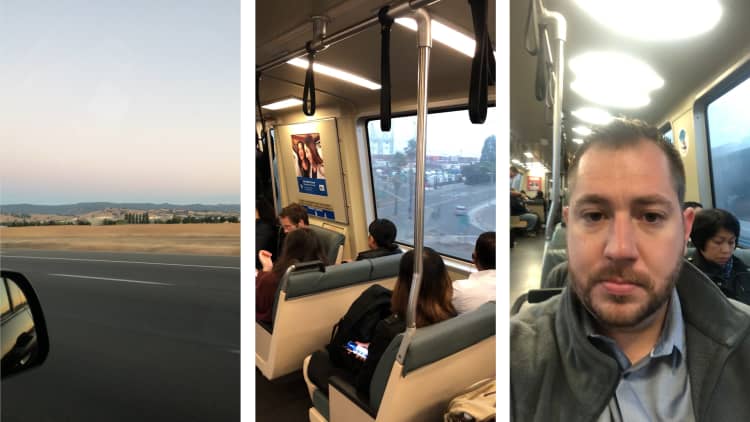It's dark and cold. The alarm clock flashes 4:30 a.m. Danny Finlay drags himself out of bed and mentally prepares for the two-hour, 72-mile commute ahead of him. And that's just the first half of his journey.
For almost a year, Finlay, 30, has been commuting to the San Francisco Bay Area from the rural town of Dixon, California, where he lives with his wife, Mireya. Previously, he traveled two hours to his job in Oakland. Now, he goes even further to his new job as an account executive at public relations firm SutherlandGold in San Francisco.
"I'm usually in the car by 5:10," he tells CNBC Make It. There isn't normally a lot of congestion that early, "but once I start to progress, maybe 20 miles in, traffic will start to hit because you're getting into more populated towns as you get closer to the Bay."
He doesn't drive the whole way, though. On days he's feeling tired, he says, "I'll usually drive about 20 minutes from Dixon to a town called Fairfield, then get on a bus for 45 minutes all the way to El Cerrito." From there, he takes a 45-minute train ride into the city and walks another 10 minutes to his office.
Other days, he'll drive from Dixon to the town of Pleasant Hill, and then take a train into San Francisco and walk the rest of the way to work.
Door to door, Finlay's commute is about two hours each morning. On the way home, it's the same: He leaves work at 4 p.m. and gets home around 6 p.m.
In total, the daily trek takes four hours and covers more than 140 miles. Given a five-day workweek, he spends about 1,000 hours commuting per year, or about 43 full days on the road.
It can be hard to call San Francisco home
Finlay took on his super-commute in response to the exorbitant housing prices in San Francisco. Job opportunities there are plenty, "specifically in the career field that I wanted to get into," he says, but the cost of living can make it hard for people to call it home.
According to financial website SmartAsset, the total cost of living in San Francisco is more than 62 percent higher than the national average. The median rent in the city is $4,500.
In New York, for comparison, median rent is $2,950. In Boston, it's $2,750. In Washington, D.C., and Miami, median rents are $2,688 and $2,475, respectively. And in the U.S. as a whole, the median rent is $1,695, nearly three times less than in San Francisco.
RENTCafé puts the median price for a one-bedroom in San Francisco at $3,261, a two-bedroom at $4,377 and a three-bedroom at a whopping $5,143.
When it comes to homebuying, the numbers go up even more dramatically: Median home prices are well over $1 million. Home investment company Unison found that you'd need to make a $349,650 annual salary to afford to buy. For someone earning an average wage, it would take 20 years to save up a 10 percent down payment.
High real estate costs aren't just isolated to San Francisco; they're a problem all over the Bay Area. In Saratoga, the median price for a home is more than $3 million. In Palo Alto, it's about $3.3 million. In Los Altos, it's more than $3.6 million. And in California's most expensive ZIP code of Atherton, the median home costs you nearly $7 million.
The problem has reached a point where even those working for Silicon Valley tech giants Facebook and Twitter and making six figures struggle to afford housing.
One woman making a combined $1 million with her partner says they can't afford a home. Some desperate residents have resorted to living in "crappy old storage rooms" that have been converted into apartments. Others in the Bay Area have resorted to sleeping in their cars.
Meanwhile, a growing number of people are leaving the region altogether.

In places like Dixon, it's still possible to buy
Finlay, a Dixon native, lived in Los Angeles while in college and stayed for work after he graduated. But after he married his wife, also a Dixon native, he says, "we started to think about where we really wanted to settle and where we wanted to buy a house. The commute allowed us to let our money go further."
They now own a three-bedroom home with a swimming pool and have mortgage payments of $1,600 a month. The commuting costs aren't too bad, either. Including gas and public transportation, Finlay says he spends less than $150 a week.
Still, the traveling has its downsides. For instance, public transportation isn't always reliable, Finlay says. "The other day, it took me three-and-a-half hours to get home because there was an accident on the freeway and the bus never showed up."
And even when he does get home without delay, that doesn't leave many hours to relax or catch up on errands. "By the time I get in, I'm pretty tired … and there's only a certain amount of time that I can do things," Finlay says. "So, it's like, do I choose to watch TV tonight, or do I choose to go to the gym? Do I go for a run, or do I walk the dog? Everything has a time limit since there's a time I have to go to bed."
Super-commuting is increasingly popular
Sydney Bennet, a senior research associate at real estate site Apartment List, attributes the rise of super-commuting to the fact that high-profile jobs are concentrated in a few select city hubs where high housing costs can lock workers out.
"Increasingly, the most lucrative jobs and most talented, wealthy people are converging in 'superstar cities' that are knowledge and technology hubs," Apartment List notes in a recent report. "Eight of the 10 metros with the largest share of super-commuters are in regions surrounding three superstar cities: San Francisco, Los Angeles and New York."
"These same three cities," the report continues, "contain 80 percent of the ZIP codes where the median home price was $1 million or more." And so, "while many higher-paid, highly educated workers can afford to live in these cities, other workers are priced out due to high demand and restrictive zoning regulations that lead to a lack of new housing."
Nationwide, one in 36 commuters travel 90-plus minutes to work each day, the report finds. And while that number may seem small, Bennet says it's growing: In 2005, there were 3.1 million super-commuters, or about 2.4 percent of all commuters. In 2016, there were 4 million, or almost 3 percent of the total.
Of the top 10 cities with the largest share of super-commuters, five are in California, and San Francisco ranks No. 6. The trend reaches to the East Coast, too: "We see people coming from all over New York, New Jersey and even Pennsylvania to have somewhere they can afford to live and have the job they want," Bennet tells CNBC Make It.
For some, "the commute is the right trade-off for their lifestyles. So, maybe they don't want to live in an urban city, but that's where the jobs are, and so they make that sacrifice to live where they want to live."
'For the next 10 years'
Housing prices, especially in superstar cities, could continue to rise. Home values in San Francisco have gone up 10 percent over the past year, reports Zillow, and are predicted to rise another 8 percent within the next year. Similar trends can be seen in popular urban areas across the country.
Bennet says building more affordable homes and more public transportation could ease the burden for many commuters. Some businesses and policymakers are working toward that.
For its part, Facebook says it's trying to address the problem in Silicon Valley. At the company's annual shareholders meeting in May, Facebook's then-chief policy officer, Elliot Schrage, said, "If we can't solve housing and transportation issues, Silicon Valley won't be Silicon Valley. Companies like ours will expand elsewhere. So we feel a real sense of urgency around that."
The company has dedicated more than $18 million to affordable and mixed-use housing, Schrage said, and is working with private partners and local governments for additional solutions.
And Elon Musk's highly anticipated Hyperloop One, on the other hand, could one day whisk commuters from city hub to city hub in airless tubes at speeds equivalent to air travel.
In the meantime, though, Finlay accepts his commute. "I mean, I wish it was shorter," he says. "But if I had the choice to live in Dixon and commute, or live in the city and not commute, I'd still commute."
The long hours can give him time to catch up with his wife, since they sometimes commute together. Plus, "to be honest," he says, "coming into a big city is fun — there's a lot happening. But it's a whole different element when I get home. It's a small town, things are easy and I have that escape."
In the grand scheme of things, he adds, "I could see myself doing this for the next 10 years."
Like this story? Subscribe to CNBC Make It on YouTube!
Don't miss: This is the most expensive ZIP code in California—and it's not in San Francisco or LA




